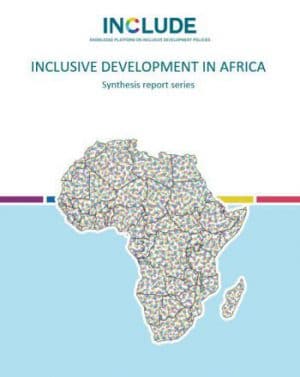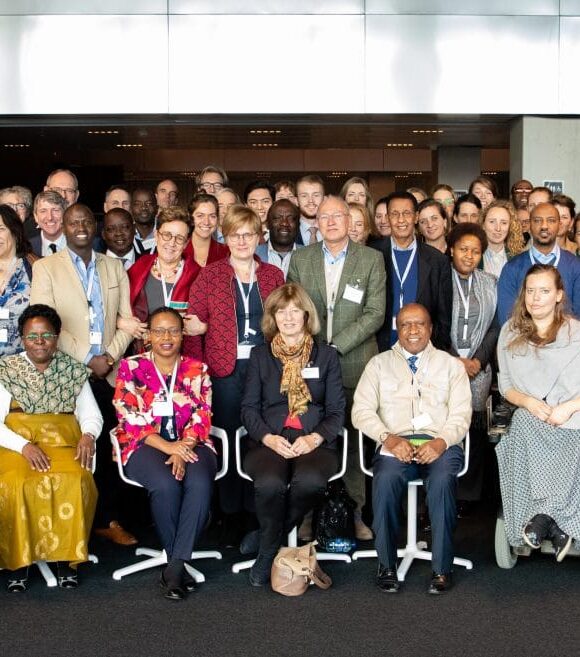 Brian Talbot
Brian Talbot
(updated on 5/07/2022) The Research for Inclusive Development in Sub-Saharan Africa (RIDSSA) programme, funded by NWO-WOTRO and coordinated by INCLUDE, was finalized after four years at the end of 2018. However, the momentum for research into social protection, productive employment and strategic actors for inclusive development did not end there. The insights and outcomes of the individual research projects continue to be relevant and provide a basis for further research. In this research update, we list some of the scientific papers that build on the RIDSSA programme projects’ work, published after the programme’s official trajectory with INCLUDE came to an end:
2022 RIDSSA programme research papers
Edited By Zeremariam Fre, Bereket Tsegay, Araya M. Teka, Nicole Kenton, John Livingstone. This book investigates the role of social protection amongst African pastoral and agro-pastoral communities, with a particular focus on Ethiopia. Based on rigorous empirical research, this book assesses the successes, failures, prospects and lessons learned from Africa’s largest social security intervention: Ethiopia’s Productive Safety Net Programme.
by Abel Ezeoha, Akinyinka Akinyoade, Ifediora Amobi, Ogbuagu Ekumankama, Paul Kamau, Agnieszka Kazimierczuk, Catherine Mukoko, Ifeanyi Okoye & Chibuike Uche. In this paper, the authors employed a blend of multiple and historical case study design, and a mix of institutional, behavioral, resource-based, and multinational theories, to examine the nature of multinational companies’ (MNC) engagements in local economic development and capital export practices in an African context. Evidence from our Nigerian case analysis (FrieslandCampina, Nigerian Breweries Plc. and Dangote Cement) confirms the proposition that, faced with a similar degree of uncertainty and constrained institutional environment and laying claims to differing sources of competitive advantage, both local and foreign MNCs would repatriate profits and limit exposures to local value chains (LVCs) mainly as a strategy for mitigating country risks and preserving corporate value.
- The Poverty Reduction Effect of Social Protection: The Pros and Cons of a Multidisciplinary Approach
By Nicky Pouw & Katja Bender.
There is a growing body of knowledge on the complex effects of social protection on poverty in Africa. This article explores the pros and cons of a multidisciplinary approach to studying social protection policies. This research aimed at studying the interaction between cash transfers and social health protection policies in terms of their impact on inclusive growth in Ghana and Kenya.
By Tanja D. Hendriks, Rafael Verbuyst & Mayke Kaag. Informal workers are a heterogeneous group distinguished by diverse activities and interests, but they have in common that they operate largely outside state regulations. In this article, the authors analyse the ways in which informal workers in Ghana are organising (themselves) in response to proposed relocations of their workspace.
By Morag Goodwin. Decentralisation plays a key role in Rwanda’s efforts to overcome the violence and instability of the past by fostering national unity and by bringing governance closer to the people. This paper examines the impact of decentralisation on the feelings of inclusion of Rwanda’s most marginalised group, the Batwa.
2021 RIDSSA programme research papers
July – December:
Associated research project: Feeder road development for inclusive productive employment. By Kebede Manjur Gebru, Crelis Rammelt, Maggi Leung, Annelies Zoomers, and Guus van Westen. This article uses qualitative data from northern Ethiopia to investigate how small-scale farmers’ market orientation to tackle food insecurity affects non-market exchange relationships. The results of this research show that integration into the market economy improves the bargaining power and autonomy of middle-income groups as well as physically fit younger generations. However, market orientation has adverse impacts on traditional practices of resource exchange. The results indicate that because these in-kind resource exchange relationships have been replaced by monetary transactions, the poor have become even more vulnerable.
Associated research project: Building the economic case for investments in social protection in Uganda. By Maria Klara Kuss, Franziska Gassmann, and Firminus Mugumya. Inclusive growth and development are essential for the sustainability of poverty reduction and growth. Social protection has been promoted as part of the inclusive growth and development agenda by emphasising the positive impacts of social transfers on people’s participation in economic processes. However, the focus on the positive economic impacts of social transfers has led to the neglect of concerns regarding inequality of opportunity. Taking the case of Uganda’s Senior Citizens Grant, this paper critically assesses how inclusive the impacts of social transfers are on economic processes.
January – June:
Associated research project: Breaking the vicious circle of poverty and ill-health
This paper by Katja Bender, Barbara Rohregger, Bethuel Kinuthia, Grace Ikua, Esther Schüring, Clement Adamba, Kennedy A.Alatinga and Nicky Pouw seeks to understand why reforms aiming at extending social protection coverage to the poor might differ across different pillars of social protection within the same country.
2020 RIDSSA programme research papers
July – December:
Associated research project: Social protection in Uganda
This paper by S Dietrich, D Malerba, A Barrientos, F Gassmann, P Mohnen & N Tirivayi reports on an ex-ante evaluation of the nationwide scale up of two pilot cash transfer programmes in Uganda.
Associated research project: The IT sector in Kenya
In this LSE Business Review article, Christian Busch and Harry Barkema write how a study shows how an enterprise in South Africa used simple rules to scale bricolage – making the best out of what is at hand.
Associated research project: Weather insurance for Ethiopian farmers
This paper by H Lun Wong et al. reports on a randomized field experiment designed to relax credit and risk constraints for agricultural activities. They conducted a study in a drought-prone region in northern Ethiopia among poor smallholders who depended on rainfed agriculture and were members of the Productive Safety Net Programme (PSNP).
Associated research poject: Social and Health Policies for Inclusive Growth
This paper by K Bender, B Rohregger, B Kinuthia, G Ikua, E Schüring, C Adamba, K A Alatinga & N Pouw seeks to understand why reforms aiming at extending social protection coverage to the poor might differ across different pillars of social protection within the same country. Being embedded within comparative institutional analysis the paper aims at providing a systematic framework for defining and explaining variations in reform dynamics highlighting the role of uncertainty. The framework is applied to the Kenyan case.
January – June:
Associated research project: The IT sector in Kenya
This paper by C Bush and H Barkema studies an incubator in Kenya, an extreme setting from an uncertainty perspective, and shows how in high-uncertainty contexts, a social structure that allows for flexibility can provide the conditions under which unexpected discoveries are enabled, facilitating opportunity-inducing networks.
Associated research poject: Social and Health Policies for Inclusive Growth
This article by N R M Pouw, B Rohregger, E Schüring, K A Alatinga, B Kinuthiad & K Benderb makes both a theoretical and empirical contribution by analyzing the complex effects and risks of social protection policies in Ghana and Kenya.
2019 RIDSSA programme research papers
Associated research project: Empowering female Ugandan entrepreneurs
This paper by G Rooks and G Solano is on gender differences in the social capital of entrepreneurs and their access to financial resources, building upon surveys of Ugandan entrepreneurs.
Associated research project: Productive employment in segmented markets
This paper by M Amare, J Mariara, R Oostendorp and M Pradhan examines data from smallholder avocado farmers in Kenya to determine the effect of export-market participation on incomes, revenue, prices, and labour inputs.
Associated research project: Social protection in the Afar region
This paper by A M Teka, G Temesgen Woldu and Z Fre shows the impact of social protection programmes on improving the consumption and income of pastoral and agro-pastoral communities in the Afar region.
Associated research project: Dutch multinational businesses in Africa
This article by A H Kazimierczuk provides a review of the latest status and policy framework for wind energy in Africa. In addition, it takes a close look at Kenya, which is one of the most successful African countries in terms of attracting renewable energy (RE) investments, including the largest wind farm on the continent.
Associated research project: Dutch multinational businesses in Africa
This paper by O Ekumankamaa, A Ezeohab and C Uche, examines the basis for the prevailing import orientation in the dairy industry in Nigeria since 1973. The paper recommends that reversing the current trend requires government’s policies that dis-incentivizes importation.[/box]


